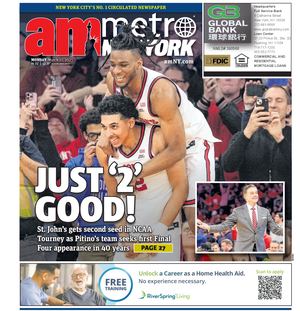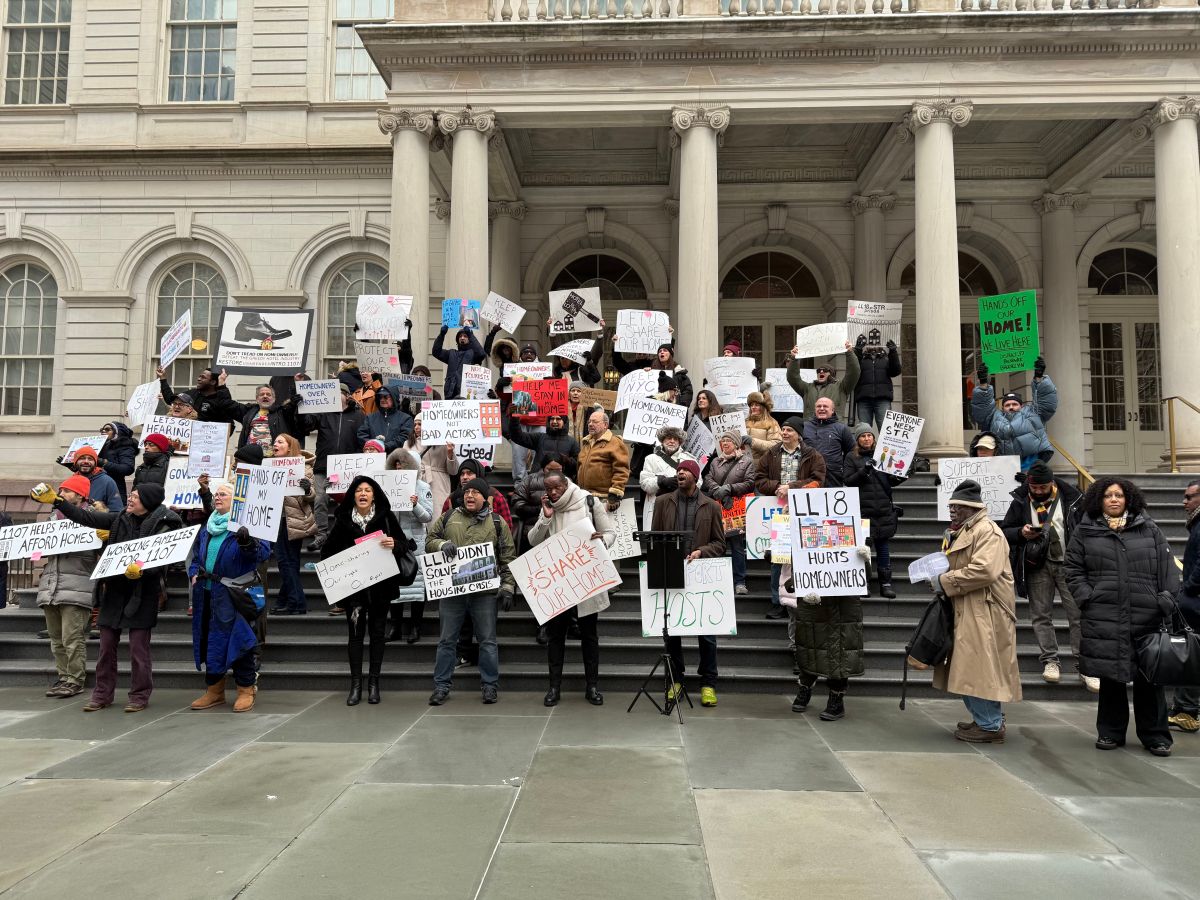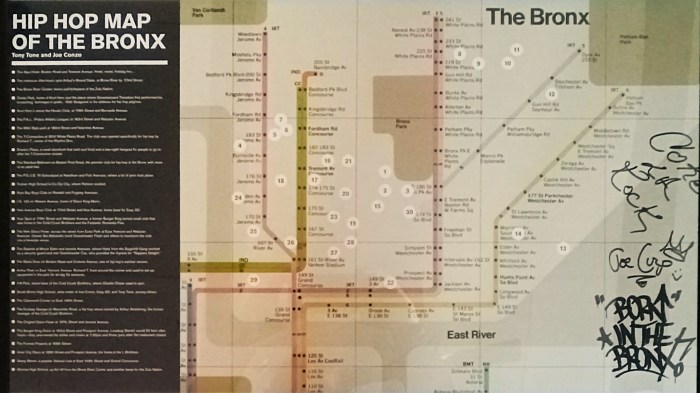Over 100 homeowners, small business owners and civil rights advocates gathered on the steps of City Hall Wednesday to push for urgent reforms to New York City’s stringent short-term rental regulations that took effect in September 2023.
The gathering, supported by a wide coalition of chambers of commerce and community organizations, spotlighted what homeowners consider detrimental impacts of rules against home sharing, a New York staple that allows people to rent out portions of their home.
The speakers called for common-sense updates to foster housing affordability for residents while enhancing economic opportunities for small businesses devastated by the new laws.
Arva Rice, president and CEO of the New York Urban League, addressed the gathering with a poignant analysis.
“Current short-term rental rules disproportionately impact neighborhoods beyond Manhattan and marginalized communities,” Rice said. “We have heard stories from our own members who are homeowners struggling to meet their mortgages and small businesses seeing fewer customers from out of town. This law needs to be reformed to support New York families and our communities across all boroughs.”
According to reports from Airbnb, the city’s recent regulations have resulted in an estimated loss of $1.6 billion in visitor spending, translating into approximately 15,700 jobs lost and a staggering $573 million decrease in worker wages, particularly in the outer boroughs.
Ralliers cried the outer boroughs — Brooklyn, Queens, the Bronx, and Staten Island — have historically benefited from short-term rentals, allowing homeowners to supplement their incomes while drawing visitors willing to explore beyond Manhattan. With the recent changes in law, these same homeowners are struggling to make ends meet.
Participants proposed key upgrades to the law, including allowing hosts to accommodate families by welcoming up to four guests, cutting restrictions that prevent homeowners from renting out their properties during their absence and implementing safety measures that allow hosts to secure personal spaces in their homes.
It’s not just the homeowners who see a need for change, speakers argued. Chamber presidents from all five boroughs released a joint statement explaining the need for home sharing.
“Home sharing drives prosperity in our communities and powers the economic engine of our small businesses by drawing visitors outside of traditional tourism districts. As living in New York becomes increasingly difficult for working-class families, home sharing provides an invaluable opportunity for extra income that can help preserve the character of our neighborhoods,” the statement read.
Manuel Lebron, founder, president, and CEO of the Dominican American Chamber of Commerce, urged the City Council to rethink these restrictive policies.
“Families visiting loved ones want to stay close to relatives—not in hotel districts far from their support systems. By limiting these options, we’re disrupting community bonds and cutting off vital revenue for local shops and restaurants,” Lebron said. “We urge the City Council to amend the short-term rental law, allowing neighborhoods to thrive alongside the visitors who bring them to life.”
That sentiment resonated with local restaurant owners experiencing diminishing foot traffic due to dwindling short-term rental options.
Sandra Jaquez, president of the New York State Latino Restaurant, Bar & Lounge Association, added that small businesses in the outer boroughs are seeing less customers.
“The City’s strict regulations on short-term rentals have significantly affected local restaurants in the outer boroughs. Fewer short-term rental options mean fewer visitors exploring these vibrant neighborhoods. It is crucial for the City to find a balanced solution that allows responsible homeowners to participate,” Jaquez said.
Elsie Saint Louis, the CEO of Haitian Americans United for Progress, Inc., emphasized the importance of protecting both homeowners and small businesses.
“The Council must safeguard the livelihoods of homeowners and businesses that rely on short-term rental visitors. In a time when so many are struggling with the rising cost of living, we must prioritize solutions that support our communities rather than harm them,” Saint Louis said.
A group of renters in favor law preventing home sharing gathered at City Hall as well to counter-protest those in favor of home sharing. A representative with Tenants Not Tourists, one of the main coalitions opposing home sharing laws, said the group heard of the protest from online posts made by Airbnb.
“Too many New Yorkers are already struggling to find permanent, affordable homes, and Airbnb’s bill would only make that problem worse by turning our housing stock into mini-hotels for tourists, rather than year-round homes for New Yorkers,” Whitney Hu, director of Civic Engagement and Research for Churches United for Fair Housing, a member of the Tenants Not Tourists coalition, told amNewYork Metro. “Our coalition includes tenants, union workers, housing advocates, and everyday New Yorkers who want to stay in their communities and continue to support the permanent businesses they know and love.”
Hu joined with nearly 200 other counter-protesters.
NYC tenants on the other side of the fight have been rallying just as much as homeowners. Over 300 tenants and housing advocates gathered on City Hall in January claiming the Airbnb bill, known as Intro. 1107, threatens the amount of rental units available.
“NYC is in a housing crisis, and our members across the city are feeling the pressure of rents that are already too high. Intro 1107 would only make this problem worse, causing rents to rise more and weakening protections for working-class tenants while allowing AirBnB to profit from this housing crisis. We’re calling on the NYC Council to reject AirBnB’s bill now,” Jamell Henderson, regional council chair of Citizen Action NYC, previously said.
Homeowners pushed back claiming since they already own their home, allowing them to home share does not affect the housing market.
The rally culminated in a united call to action. Local leaders, businesses, and everyday New Yorkers are imploring the City Council to consider these common-sense proposals for altering the current short-term rental laws. They believe that reforms can empower homeowners, support small businesses, and ultimately preserve the unique vibrancy and diversity that define New York City neighborhoods.
(Updated Feb. 13, 2024 at 4:28 p.m.): This story has been updated to include input from counter protesters.
Read More: https://www.amny.com/business/





































